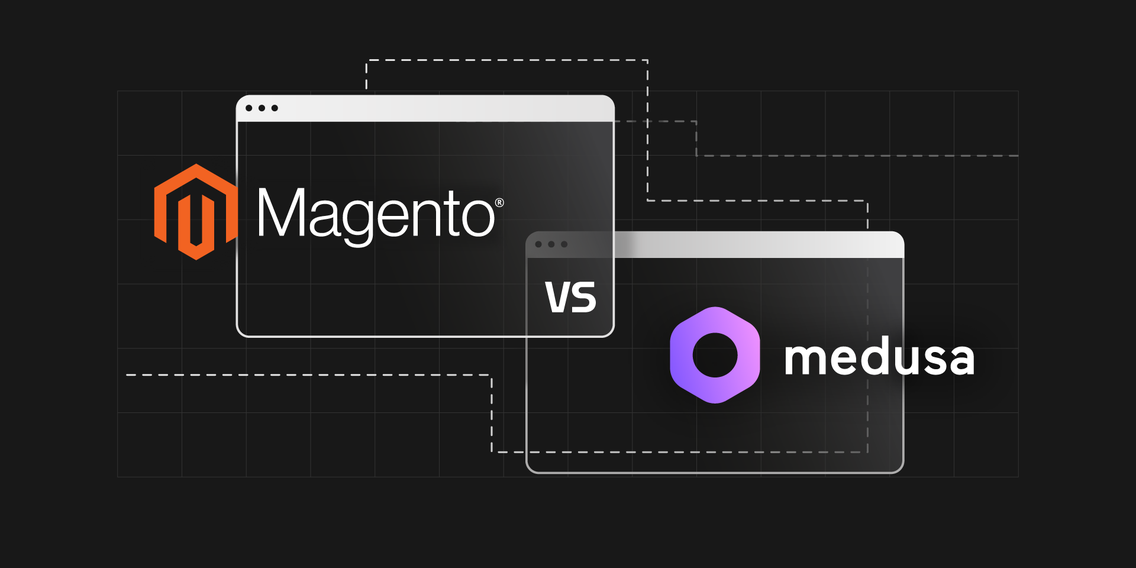5 min
September 25, 2025
Medusa vs. Magento: Which Platform is Better for Your E-commerce Business?
Choosing the right e-commerce platform in 2025 is a strategic decision that will define your business's growth for years to come. It’s no longer just about functionality, but about selecting the architecture that best suits your goals. The market presents two distinct philosophies: the stability of an established monolith and the total flexibility of a headless system. It's worth noting, however, that these lines are blurring—for example, Magento, while a monolith, can be successfully used in a headless architecture.
In this article, we'll take a deep dive into Magento, a proven leader, and Medusa, an innovative headless framework. We'll examine their key features to help you make an informed decision on which solution is a better investment for the future of your store, keeping their scale and purpose in mind.

Listen to the audio version of this article.
Architecture: Monolith vs. Headless
The most significant difference between these platforms lies in their architecture, which defines both their capabilities and limitations.
Magento
Magento is built on a traditional monolithic architecture, which means the front-end and back-end are tightly integrated in a single, cohesive package. This design has its advantages: all functionalities are ready to use out of the box, which speeds up the initial launch and simplifies management in the early stages. It's an "all-in-one" system, perfect for businesses that need standard, comprehensive software. While a monolith by default, Magento also offers a robust API (GraphQL/REST) that allows the front-end to be decoupled and used in a headless architecture, providing flexibility for more advanced projects.

Source: Magento Digital Commerce Architecture
Medusa
Medusa represents a modern, API-first headless architecture. In this model, the back-end is completely separated from the front-end, giving you full freedom to build any user interface. The challenge? This flexibility requires building the front-end from scratch, which translates to a more complex development process.

When to choose a monolith vs. headless?
If you need a quick start and want to manage all store elements from a single admin panel, a monolith might be a good choice. However, if your priority is complete control over UX and unique integrations, and your project has a strong development team, headless is the architecture of the future.
Flexibility and Scalability
Choosing a platform is also a decision about your store's ability to grow and adapt to new market demands.

Magento
This platform handles the scalability of large, structured stores well. Its stability is highly valued in large, complex implementations. On the other hand, any major change or handling of sudden, massive traffic spikes may require complex modifications to the entire system. While a headless architecture allows for the independent scaling of the front-end, which significantly boosts performance, it's important to remember that managing such complex systems still requires advanced development expertise.
Medusa
Medusa offers a completely different level of flexibility and scalability as a framework. Its API-first architecture allows for seamless integration with any external tools like a CMS, PIM, or ERP. This lets you customize every element of your store. However, it's a smaller solution than Magento and lacks key built-in features and conveniences, such as managing product attributes (attribute sets) or multi-language support, which you must implement yourself.
Which solution offers more?
Due to its maturity, Magento provides a richer set of built-in features, making it a better choice for advanced e-commerce. Medusa offers immense freedom but requires more effort to build core functionalities that are standard in Magento.
Costs: A Short- and Long-Term Analysis
Cost analysis is a key part of any business decision, but with e-commerce platforms, perceived savings can turn into a trap.

Magento
At first glance, Magento Open Source might seem like a "free" option. The reality is different: the lack of licensing fees is quickly offset by high maintenance costs. The monolithic nature of the platform, which requires specialized development knowledge, means that updates, integrations, and ongoing fixes are often more expensive and time-consuming. On the other hand, Adobe Commerce is a solution with significantly higher initial costs due to licensing fees but offers advanced support.
Medusa
Medusa operates on a different principle. It's an open-source project, so there are no licensing fees. Your main initial cost is primarily the development cost of building a custom front-end. While this might be a larger upfront expense, Medusa's flexibility translates into lower long-term maintenance costs. However, it's worth noting that the lack of ready-made modules that are standard in Magento can increase development costs for more complex needs.
Which option is more cost-effective?
If you're looking for a quick, ready-made solution and your company has a high maintenance budget, Magento can be an acceptable choice. However, in the long run, Medusa is a cheaper option, ideal for smaller businesses that don't need extensive functionalities.
Support: Which Platform Comes Out on Top?
While architecture and costs are key, the day-to-day experience also depends on usability and available support.

Magento
Over the years, Magento has built a powerful ecosystem, which is one of its greatest strengths. The admin panel is intuitive and offers a vast number of features in one place, which is very convenient for non-technical users. Additionally, its huge developer community and thousands of ready-made extensions mean that almost every problem already has a solution.
Medusa
As a newer framework, Medusa offers a minimalist but very efficient admin panel. Its community is smaller but still active. However, this is not a bad thing, as it opens the door to creating highly custom solutions.
Which tool is more intuitive?
If your business needs a solid, ready-made solution with an extensive admin panel, Magento is the easier choice. Medusa is a developer's tool for those who value freedom and flexibility in creating unique solutions.
Magento vs. Medusa: Recommendations
The decision to choose a platform is always a trade-off between a ready-made solution and complete freedom.
When to choose Magento?
Magento is the ideal choice for larger, structured B2B or B2C companies that need a comprehensive solution with a rich set of built-in features. If you value a well-established market position, an extensive admin panel, and have standard needs, Magento will be a solid foundation for your business. Notably, even though its default architecture is a monolith, Magento can be used in a headless model, giving it added flexibility for advanced projects.
Who is Medusa for?
Medusa is for companies that want full control over the user experience and aren't afraid to experiment with technologies. It's the best option for projects that require complete freedom in integrating with other systems and have a strong development team. It's an excellent framework for smaller e-commerce sites where a full Magento implementation would be overkill and cost-prohibitive. In return, it offers flexibility that allows for unlimited growth, albeit with the necessity of building many features from scratch.
Choosing the right platform is a complex decision that requires a thorough analysis. If you need expert advice on selecting the best solution for your business, contact us. We'll help you make an informed decision that will bring real benefits in the future.
FAQ
1.Is Medusa suitable for small e-commerce stores?
Yes, Medusa can be effectively used for smaller projects, especially if you plan to scale the business and value full control over the interface (frontend).
2.Can Magento be implemented in a headless architecture?
Yes, despite its monolithic nature, Magento has an extensive API that allows for the separation of the frontend.
3.What are the key advantages of headless architecture in e-commerce?
The main advantages are unlimited flexibility in building the frontend, high website performance, and the freedom to integrate with any tools that will support your business.
4.Which platform is more cost-effective in the long run: Magento or Medusa?
Medusa is generally more cost-effective in the long run for small and medium-sized projects—the lack of licensing fees and its flexible architecture lower maintenance costs. Magento, on the other hand, works better for large, complex stores where, despite higher costs, it offers greater scalability and ready-made functionalities.




